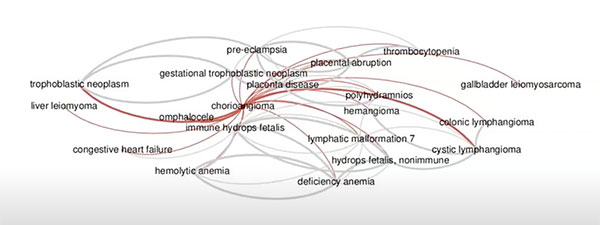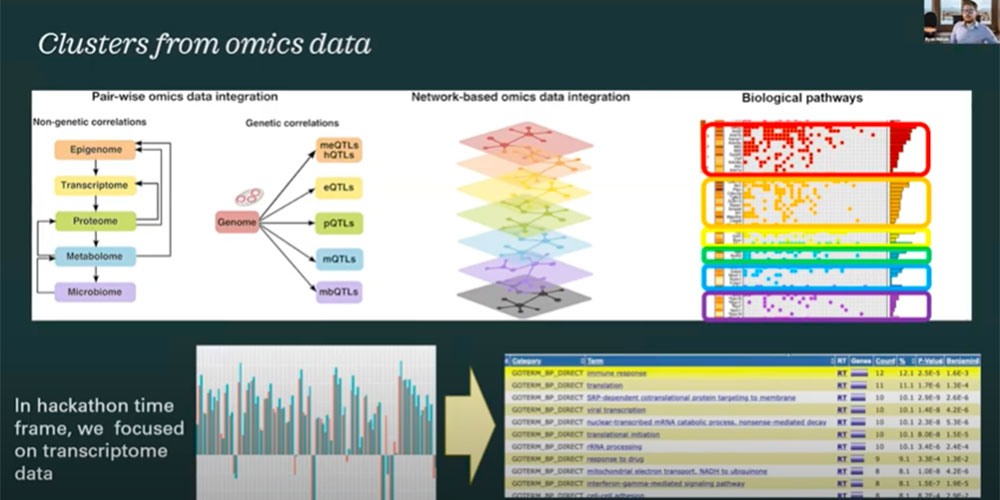Watch the Cancer Hackathon Showcase
For 38 hours, 50 participants spread across 12 teams competed for cash and prizes at the third annual Data Science Hackathon organized by the UAB Informatics Institute in collaboration with the Center for Clinical and Translational Science, the O’Neal Comprehensive Cancer Center at UAB, and the UAB Hugh Kaul Precision Medicine Institute. The AI Against Cancer event, held Aug. 9-10, 2021, challenged participants to solve cancer-related challenges that may lead to improvements in prevention, treatment or health care practice (see list of winning projects below).
By any measure, cancer is a major issue. It is the second-leading cause of death worldwide, responsible for one in six deaths (9.6 million in 2018) and $1.16 trillion in health care costs. “While much progress has been made, we still have a long way to go,” said the hackathon’s organizing chair, Amy Y. Wang, M.D., associate professor of medicine and scientist in the Informatics Institute. “We have effective screening, prevention, diagnosis and treatment for many cancers. Unfortunately, despite decades of cancer research, many patients develop aggressive cancers that are resistant to treatment.” This gap can be addressed by studying large volumes of data, Wang said. “The abundance of everyday and research data from patients, genomes, populations and the environment, together with data science, provide rich opportunities to advance our understanding about cancer.”
As hackathon co-chair Jake Chen, Ph.D., associate director of the Informatics Institute, shared in his keynote talk, cancer has the attention of bioinformaticists and data scientists. “Research on artificial intelligence and machine learning in cancer has quadrupled since 2016,” Chen said, with 1,147 papers on the topic published to the NIH PubMed database in that year, compared with 4,914 papers published in 2020. “That interest partially inspired us to select cancer as our topic for this hackathon,” Chen said, following the 2020 hackathon’s focus on COVID-19.
Big data is everywhere in cancer, Chen explains, from the next-generation DNA gene sequencing used to profile patient tumors to the digitized pathology images and electronic health records that researchers have mined for new insights into cancer care. “People want to extend disease-free survival times, develop early diagnostic tests and create personalized, targeted therapies,” Chen said. “And all of that relies on mathematical modeling.”
 A detail from the presentation by the BirthSeq-AI team, which won the Health Equity award at the hackathon.
A detail from the presentation by the BirthSeq-AI team, which won the Health Equity award at the hackathon.Let the hackathon begin
So, what is a hackathon, exactly? “A hackathon is an event in which a large number of people meet to engage in collaborative computer programming,” Wang said.
As with last year’s event, the pandemic meant the meetings were virtual; but the interdisciplinary, international spirit of the hacking marathon remained. In addition to UAB students, faculty and staff from the School of Medicine and College of Arts and Sciences, participants included a data scientist from the University of Wisconsin, an engineering researcher from the University of the Aegean in Greece and a high school student from Indianapolis, Indiana.
Before the hackathon began, participants had a chance to share any existing project ideas they had and coalesce in groups around common interests or skillset needs. Groups worked with mentors, often faculty members already collaborating with some of the team members. “Often, the mentors and team members jointly developed project ideas that aligned with everyone’s expertise and interests,” Wang said. “There were also cases in which we asked mentors with expertise relevant to specific projects to meet with groups to evaluate their projects and give feedback.”
 Detail from the presentation by Team Ditto, which took second place in the hackathon.
Detail from the presentation by Team Ditto, which took second place in the hackathon.Interdisciplinary showcase
The 12 teams worked on a broad range of projects, with some tackling cancers of the blood, brain, breast, colon, eyes and placental tissue. Other groups attempted to answer more holistic questions around the impact of vitamin D on oncogenes, the chemical features of multi-drug response and predicting tumor mutation burden from histopathological images.
Christopher Willey, M.D., Ph.D., professor in the Department of Radiation Oncology and director of the UAB Kinome Core, served as mentor for the winning group, which focused on glioblastoma, the most aggressive type of brain cancer. Team Kinome — which also included a researcher, a postdoctoral fellow and a resident physician — took home the top award of $2,500 for their project, Development of Kinomic Profiling Signatures that Associate with Kinase Inhibitor Sensitivity in Glioblastoma PDX. (See a full list of winners below.)
The Greek researcher — Vasileios Alevizos — and Indiana high school student — Vanessa Xiao — were both part of Team Alpha, which took home the MCBIOS Interdisciplinary Team Science Award, and $1,000, for a project on cancers of the eye, titled Conjunctival and Corneal Tumor Detection and Recognition. Team Alpha, mentored by Chen, included a postdoc working in the Informatics Institute, Zongliang Yue, Ph.D., and a research data scientist from the University of Wisconsin, Clark Xu, Ph.D.
How exactly did this interesting group come together? “Clark participated in last year’s hackathon, and we invited last year’s participants to this year’s event,” Wang said. “Vasileios was interested in joining a hackathon focused on bioinformatics, so he searched for ‘bioinformatics hackathon’ and found our announcement in our Twitter feed. And Vanessa works with Dr. Charlie Dong, a professor of biochemistry and molecular biology at Indiana University, who told her about the hackathon.” (Dong knew Chen from Chen’s time at Indiana University before he came to Birmingham.)
“I was interested in using AI for another research project I was working on, and [Professor Dong] thought it could be a great experience to learn more about the intersection of cancer research and AI — and he was right,” said Xiao, the high school student. “I loved learning more about AI algorithms and which parts of AI could be implemented to do research and how.”
More to come
The success of this year’s event — which featured a record number of teams and projects — means organizers are already thinking about their next hackathon, Wang and Chen say.
“Hackathons are highly effective for advancing research, especially developing new ideas in a short time,” Wang said. “Bringing together interested and motivated scientists with learning opportunities, resources and awards forms an ideal environment for magic to happen.”
In addition to the Informatics Institute and stated collaborators, co-sponsors included the Midsouth Computational Biology and Bioinformatics Society (MCBIOS) and Shipt.
2021 AI Against Cancer hackathon winners
First prize
Team Kinome
Joshua Anderson, Ph.D., Ehsan Saghapour, Ph.D., Kevin Lee, M.D., Ph.D., mentor Christopher Willey, M.D., Ph.D.
Development of Kinomic Profiling Signatures that Associate with Kinase Inhibitor Sensitivity in Glioblastoma PDX
Second prize
Team Ditto
Ryan L. Melvin, Ph.D., Tarun Mamidi, Thi K. Tran-Nguyen, Ph.D., Rati Chkheidze, M.D., mentor Liz Worthey, Ph.D.
AI Guided Multiomics Data Mapping on Pathology Whole Slide Images of Glioblastoma
Third prize
PhenoMiner
Nilesh Kumar, Bharat Mishra, mentor Zhiying Lu, Ph.D.
Natural Language Processing System for Retrieving Information about Cancer Phenotypes from Published Articles
MCBIOS Interdisciplinary Team Science Award
Team Alpha
Zongliang Yue, Ph.D., Clark Xu, Vanessa Xiao, Vasileios Alevizos, mentor Jake Chen, Ph.D.
Conjunctival and Corneal Tumor Detection and Recognition
Health Equity Award
BirthSeq-AI
Gurpreet Kaur, Ph.D., Brandon Wilk, Shaurita Hutchins, Kristen Coutinho, mentor Liz Worthey, Ph.D.
Development of an AI-based Approach to Better Understand Chorangiomas by Studying Placental Heterogeneity